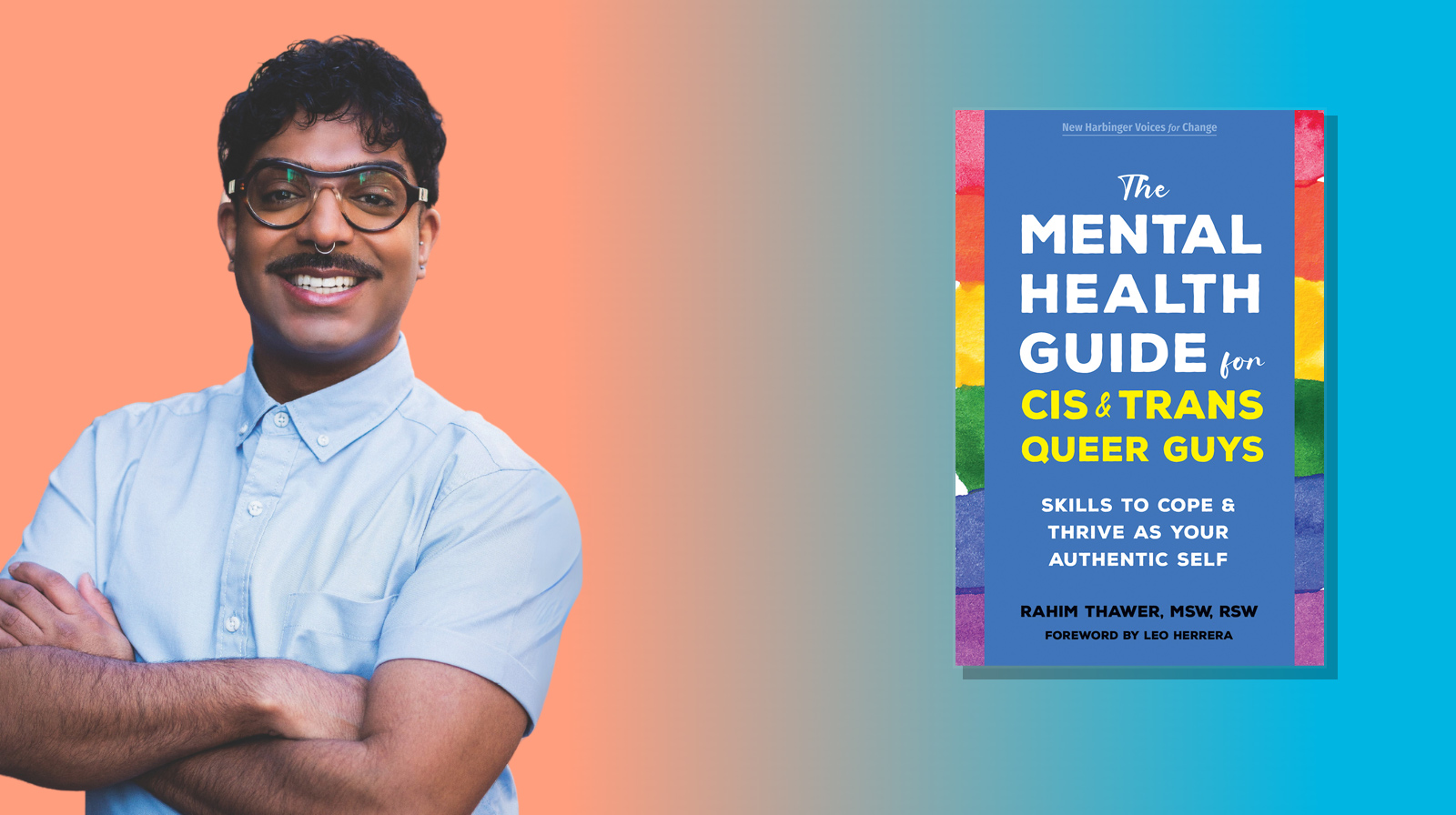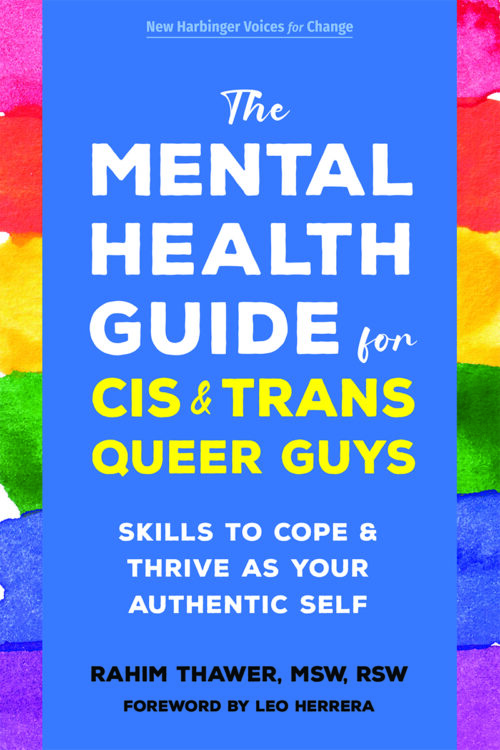Book Club: The Mental Health Guide for Cis and Trans Queer Guys

Subscribe to Catalyst
Subscribe to get our magazine delivered right to your inbox
Related Articles
Related Articles
It’s more than just another self-help book. The Mental Health Guide for Cis and Trans Queer Guys (New Harbinger Publications, June 2025) blends personal reflection, clinical insight, and a heartfelt tribute to queer men navigating their mental health in a complex – and often contradictory – world.
Rahim Thawer, a queer Muslim social worker and doctoral candidate at the University of Alabama, draws deeply from his lived experiences, his professional work as a psychotherapist, and numerous conversations with queer and trans men.
They face myriad challenges throughout their lives, from the processes of coming out, to the nuances of growing older, and everything in between.
Topics including internalized shame, heteronormative culture, managing rejection, and substance use are explored in depth. For each subject, Thawer skillfully combines academic knowledge with real-life case studies, providing readers with practical tools and guidance to reflect on their own experiences.
Solid resource
The book is an excellent teaching resource for clinicians who may not fully grasp the historical and ongoing impact of gay, bisexual, trans, queer/questioning (GBTQ) men and their experiences. Although Thawer’s guide is primarily written with queer men in mind, it has already garnered attention from therapists and educators eager to better support queer communities, something Thawer is familiar with. In his private practice, he frequently supervises clinicians seeking cultural guidance for their cases.
For example, clinicians have approached him to say, “I’m working with a gay man struggling with shame,” or “I’m supporting a queer Muslim client who hasn’t come out yet.” These professionals are seeking a framework to understand underlying issues – and Thawer’s book provides just that. It breaks down complex issues such as internalized stigma, anticipatory rejection, and challenging family relationships – and turns it into actionable insights and interventions.
Thawer’s contributions to the field have not gone unnoticed. He is the recipient of the 2025 Mary Smith Arnold Anti-Oppression Award from Counselors for Social Justice in the U.S. and also received the 2025 Honorary Award in Education from the nonprofit South Asian Americans for Change. These accolades affirm his significant role in advancing culturally attuned practices across diverse communities.
I had the opportunity to chat with Rahim recently, and the following are some excerpts from our conversation.

Psychotherapist and doctoral candidate Rahim Thawer works in the U.S. and studied in Toronto. His new book speaks to complex issues in practical ways.
Q: What inspired you to do this? It’s a big subject and a challenging one. So, what was your motivation?
A: I started my professional work and career in the HIV sector and so many of the workshops we did that were geared to reduce risk of HIV transmission, and at other times, geared toward helping people live well with HIV, they were quite limited. They were all surrounding HIV and many communities that we met didn’t need that specifically. They needed something adjacent to that, like anti-homophobia, talking about sexuality more broadly, talking about the landscape of relationships. Now, arguably, all of that is related to HIV, but I wanted to decenter the epidemic and think about what are all the things in our subculture that contribute to our mental health outcomes? Because I think queer and trans guys live in a different world. We’ve got different norms, different expectations, our own culture, our own history. We live in multiple worlds, and I think that’s what determines our mental health outcomes. So, for me, I wanted to take both my lived experience as a queer guy and my work as a therapist to really think about what are all the things that affect our mental health.
The book that I wrote, it’s not a research book. I didn’t do a study to say what are the things that affect us. I thought, here are the things I’m seeing, and feeling, and living. What if we itemize those and talked about them? That’s where the idea came from.
Q: In the world around us, we’re hearing more and more of an upsurge in anti-gay, anti-queer, and especially anti-trans, rhetoric, both culturally and politically. How do you think that’s impacting or going to impact our community?
A: Well, I think the impact will be seen long term, because right now people have anxiety about their current rights or protections becoming limited, and that anxiety is legitimate. However, for people who are well-to-do, have been out for a long time, have access to lots of resources, they were able to do that because of rights, legalization of gay marriage, decriminalization of homosexuality, because of opportunities to afford mobility. In some cases, when you combine those things with male privilege, it paved a way for them, but those very successful people, still, I would see in my therapy practice struggling with shame, relationships, internalized stigma, and fraught relationships with their families of origin. So, my point is that even when people seem to be fine in the political sphere, the messages they’ve internalized at a young age stay with them for a long time. And that is to say that before this wave of anti-trans rhetoric showed up, we were struggling in many ways with our past. And I think the anxiety around the political condition is very valid, but I think the repercussions will be felt long term. And that part is very unfortunate because lots of people will say, ‘oh, we’ll just wait four years and then we’ll get somebody new.’ And I’m thinking, no, it doesn’t quite work like that. The message is the fear; you absorb it. It stays in your body. And it’s detrimental.

The Mental Health Guide for Cis and Trans Queer Guys
Q: Do you see any opportunities from a prevention perspective in the upcoming years?
A: Potentially. I think within the broader LGBTQ community, a lot of cisgender gay men, cisgender lesbians who are in their 40s, 50s, 60s, if they’ve been able to access some comfort in their world, in their life, in their time, this might be a time where they look inward into the community and support people who are still struggling. We’re going to need some serious solidarity with trans communities, and we have for a long time needed more internal solidarity with underhoused and homeless LGBTQ youth. That is a big problem in Toronto and other metropolitan cities.
I think what we’re seeing politically is defunding of all things DEI (diversity, equity, and inclusion). And if that means cuts to LGBTQ care, then we’re going to have to rely on a different economy, which has to be more communal and collective.
Author: Ed Mantler has led innovation and improvement in healthcare for more than three decades. He trained as a Registered Psychiatric Nurse, holds a Master of Science Administration, and is a Fellow of the Canadian College of Health Leaders.